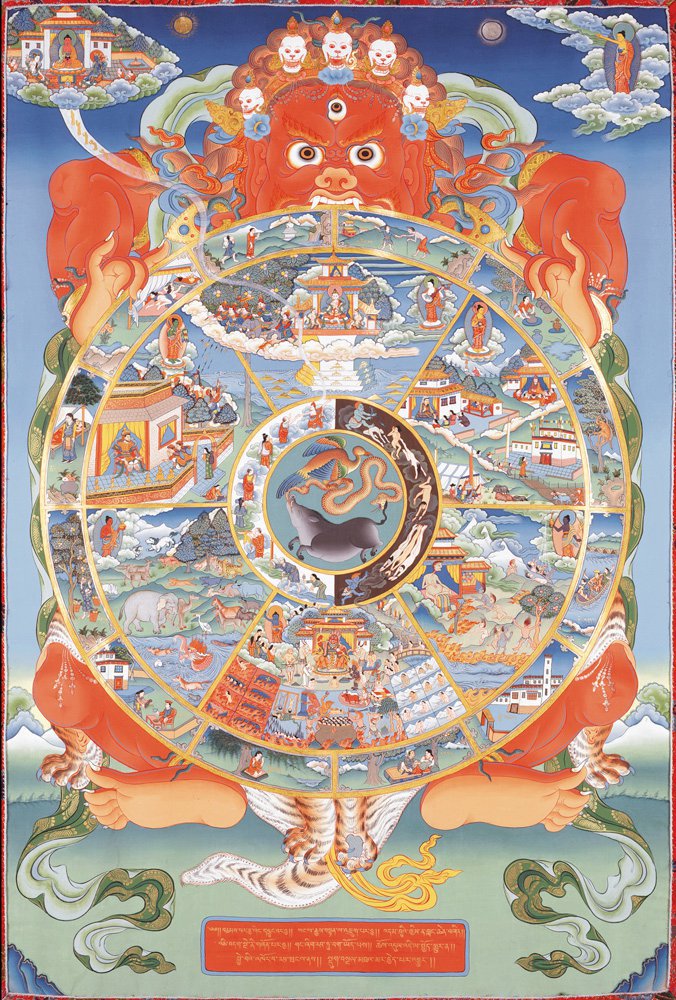If all of this were empty,
Nothing would arise or be destroyed.
For you it follows that
There are no four noble truths. [24.1]
Since there are no four noble truths,
Complete understanding and elimination,
As well as familiarization and actualization,
Do not make any sense. [24.2]
Without these,
The four fruitions do not exist either.
Without fruition, there is no one abiding in that,
Nor anyone who has gained entry. [24.3]
If the eight persons do not exist,
Then there is no Sangha.
Because there are no noble truths,
There is no sacred Dharma. [24.4]
If there is no Dharma and no Sangha,
How could there be any Buddha?
This teaching of emptiness
Invalidates the three jewels. [24.5]
Likewise, the existence of results,
Non-Dharma and Dharma,
And all the conventions of the world
Would likewise be invalidated thereby. [24.6]
To explain, you have not understood
The purpose of emptiness,
Emptiness itself, or its meaning.
Therefore this is damaging to you. [24.7]
The Dharma taught by the Buddhas
Is genuinely based on the two truths:
The relative truth of the world
And the truth of the ultimate meaning. [24.8]
Those who do not understand
The distinction between these two truths,
Fail to comprehend the profound reality
Of the Buddha’s teaching. [24.9]
Without relying on convention,
The ultimate cannot be shown.
Without realizing the ultimate,
Suffering cannot be transcended. [24.10]
When viewing emptiness incorrectly,
Those with little insight will be ruined,
As when a snake is caught in the wrong way,
Or a knowledge mantra is used incorrectly. [24.11]
Hence, knowing that the depth of this Dharma
Would be hard for the feebleminded to understand,
The realized mind of the Able One
Turned entirely away from teaching the Dharma. [24.12]
The flaws that ensue in consequence
Are not reasonable with respect to emptiness.
Hence, your discarding emptiness
Is not reasonable to me. [24.13]
Everything is possible
For those for whom emptiness is possible.
Nothing is possible
For those for whom emptiness is impossible. [24.14]
All your own faults
You project onto me,
As if, while riding your horse,
You had forgotten all about it. [24.15]
If you view things
As existent by nature,
Then for you there are
No causes and conditions. [24.16]
Effect and cause;
Agent, means, and actions;
Arising, cessation, and result--
These are invalidated as well. [24.17]
That which originates in dependence
Is taught to be emptiness.
This itself is dependent imputation
And so the path of the Middle Way. [24.18]
Apart from what originates dependently,
There are no phenomena at all.
Therefore, apart from emptiness,
There are no phenomena at all. [24.19]
If all of this were not empty,
Nothing would arise or be destroyed.
For you it follows that
There are no four noble truths. [24.20]
As it would not originate dependently,
How could there be suffering?
The teaching that the impermanent is suffering
Cannot be relevant where nature exists. [24.21]
Given natural existence,
What could originate?
Hence, for those who deny emptiness,
There cannot be any origin. [24.22]
If suffering exists by nature,
There can be no cessation.
As it would remain completely,
Cessation would be invalidated. [24.23]
If there were a nature of the path,
It could not reasonably be cultivated.
If the path is to be cultivated,
Then this nature of yours does not exist. [24.24]
If there is neither suffering
Nor its origin and cessation,
What cessation of suffering
Do you assert is achieved by the path? [24.25]
If complete understanding
Were absent by nature,
How could complete understanding occur?
Does nature not remain? [24.26]
The same with your elimination,
Actualization, familiarization,
Cultivation, and four fruitions--
They are as impossible as complete understanding. [24.27]
Since they retain their own nature,
How could fruitions that are
By nature unachieved
Ever be achieved? [24.28]
Without fruition, there is no one abiding in it,
Nor anyone who has gained entry,
If the eight persons do not exist,
Then there is no Sangha. [24.29]
Because there are no noble truths,
There is no Dharma either.
If there are no Dharma and Sangha,
How could there be any Buddha? [24.30]
For you it follows that the Buddha
Does not depend on enlightenment.
For you it follows that enlightenment
Does not depend on the Buddha. [24.31]
For you, the one who by nature is no Buddha
May pursue the conduct of enlightenment
In order to attain enlightenment,
Yet all such efforts will be in vain. [24.32]
Nobody would ever perform
Dharma or non-Dharma.
What can be done to the not empty?
There can be no action in relation to nature. [24.33]
In the absence of Dharma and non-Dharma,
For you, there are still effects.
Effects caused by Dharma and non-Dharma
For you, do not exist. [24.34]
If, for you, there are effects
That arise from Dharma and non-Dharma,
Why, then, would these effects
Of Dharma and non-dharma not be empty? [24.35]
The one who denies
The emptiness of dependent origination
Will, likewise, be denying
All conventions of the world. [24.36]
A denial of emptiness
Will preclude all action.
There will be actions without initiation,
As well as agents without anything done. [24.37]
If beings had any nature,
They would not be born or die.
Indeed, they would remain immutable
And would not know a variety of states. [24.38]
Were it not for emptiness,
The unattained could not be attained,
There would be no liberation from suffering,
And no elimination of action and affliction. [24.39]
The one who sees
Dependent origination
Sees suffering, its origin,
Cessation, and the path. [24.40] <- Prev Next ->

